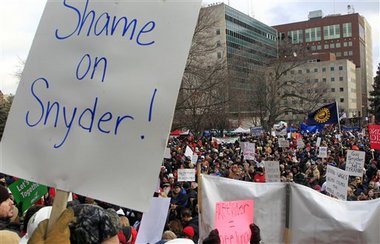Ann Arbor Public Schools teachers will continue voting Thursday on whether to give up 3 percent of their pay to help the district reduce its budget by $17 million to $20 million for the 2013-14 academic year.
Voting began Wednesday on a tentative agreement between the union and district administration.

Thousands rally in Lansing in December to protest Michigan's Right to Work legislation. Ann Arbor Education Association teachers also took part in the rally, and now the union is voting on new contract language before Michigan becomes a Right to Work state.
AP file photo
Administrators have estimated a 1-percent across-the-board cut for district staff could save AAPS $1.3 million. It is not immediately known how much the 3-percent cut on the table for Ann Arbor Education Association members would save.
Union members told AnnArbor.com the tentative agreement includes:
- A 3-percent salary reduction for all teachers for the 2013-14 academic year.
- New MESSA insurance options for teachers that will coexist with the current health care offerings at no additional cost to the district. MESSA is a Michigan Education Association insurance provider.
- A slightly revised district calendar.
- A clause affirming the union's right to collect dues and shielding it from the Right to Work legislation that takes effect March 27.
- The reinstatement of a curriculum council with teacher involvement.
- The development of a science teacher and administration problem-solving group to address science class size issues and overfilled science labs.
The salary reduction would not affect teachers' movement up the salary scale, union members said.
The tentative agreement was presented to the AAEA's general membership during a meeting Monday. Union President Linda Carter, who until last year was president of MESSA, could not be reached Wednesday for comment on the agreement. Superintendent Patricia Green declined to speak about the agreement at Wednesday's school board meeting, stating the district does not comment about ongoing negotiations.
On Wednesday, the school board did set a closed executive session for the purpose of contract negotiations prior to the March 27 regular meeting. The executive session will take place at 5:30 p.m. with the regular meeting starting at 7 p.m.
Union members said the tentative agreement is about five pages in length. They said the clause pertaining to Right to Work would take effect June 30 and run until June 2016 only if the tentative agreement is passed prior to March 27, the date Michigan becomes a Right to Work state. Right to Work is a measure that prohibits unions from requiring the payment of dues as a condition of employment.
The tentative agreement for 2013-14, if passed, would not replace the district's existing contract with the AAEA, in which AAPS is obligated to pay back $4.5 million to the teachers union for money the union saved the district in 2010, said Brit Satchwell, former AAEA president.
Satchwell, who was on the bargaining team when the existing contract was negotiated, responded to questions from AnnArbor.com about the new agreement. He said the current contract has no expiration date and explained that the payback is contingent upon the improved financial status of the district.
"In essence, the district asked us for $4.5 million in savings, and we gave them it by loaning them ($3 million) over the course of three years," Satchwell said, adding the union's concessions were worth collectively about $3 million, but they resulted in a nearly $4.5 million savings for the district because of the amount of money the district pays to the state and federal government for employee pension costs and the Federal Insurance Contributions Act (FICA) tax, respectively.

Former AAEA President and current Ann Arbor teacher Brit Satchwell
In the contract agreement ratified in June 2010, the AAEA entered a wage freeze for the duration of the contract, increased the number of teacher furlough days and took cuts to members' supplemental pay, among other things, according to the master agreement. And these concessions will remain in place until a couple of "triggers" happen within the district's general fund, Satchwell said.
According to the agreement, each year the total general fund revenue is compared to the previous year's total general fund revenue; and if there is a decrease in revenue from one year to the next, the pay scale for teachers remains the same. If there is an increase in revenue, however, and the district's fund balance increases to at least 10 percent of the district's expenditures, then 75 percent the general fund revenue increase must be allotted to employees.
"This provision remains in effect until a minimum of $4.5 million has been applied to the salary scale and/or health benefits" of AAEA members, the 2010 agreement states.
Satchwell said the district has not been able to reimburse the union any money since 2010 because those financial payback "triggers" or conditions have not been met.
Satchwell said he wasn't at Monday's general membership meeting but reviewed the tentative agreement afterward. While he is happy the existing contract and payback agreement will not be impacted by the tentative agreement even if it passes, he said he feels "betrayed by both my union and my employer."
"Shame on both of them," he said. "I don't think that either side should have opened the contract. (When we passed the contract,) we wanted them to rebuild their fund balance by controlling their expenses and I'm not sure that they (the administration) have done a good job of that. Instead, they've built their own deficit on top of the one handed down to them from the state (funding situation).
"And now despite the deal already on the table, they're coming back to us to be their easy button."
Satchwell added he's not sure why teachers are essentially paying 3 percent of their salaries only to get MESSA insurance plans at AAPS that will cost the district nothing and to launch "common sense things that they should do anyway," a reference to the curriculum and science groups that are a part of the agreement.
Satchwell said because the existing union contract has no expiration date, he does not think Right to Work legislation would impact the AAEA until after the $4.5 million is paid back and the contract is fulfilled or another contract is negotiated.
Only contracts that take effect after or are renewed after March 27 will be affected by the Right to Work law, according to previous reports.
"The union's running scared and is using scare tactics on its members," Satchwell said.
Danielle Arndt covers K-12 education for AnnArbor.com. Follow her on Twitter @DanielleArndt or email her at daniellearndt@annarbor.com.